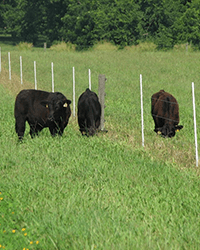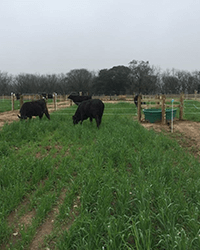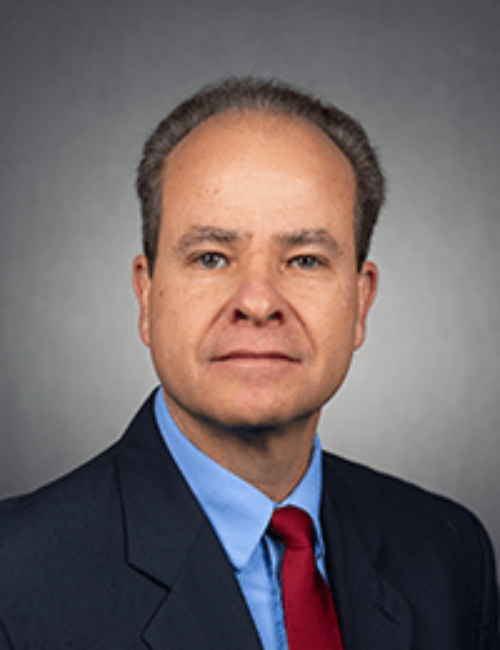Dr. Dubeux, Jose
Professor
Forage Agronomy
Dr. Jose Dubeux received his B.S. in Agronomy (1990) at the Federal Rural University of Pernambuco (UFRPE), MS in Animal Science at the same University in 1995, and PhD in Agronomy at the University of Florida in 2005. During his PhD program, José received the Paul Harris Award in 2003 and 2004 and also the Robert F. Barnes award during the ASA-CSSA-SSSA meeting in Seattle (2004). His PhD Dissertation was elected the best Dissertation in 2005 by the Agronomy Department at UF. In 1997, Jose was hired as an Assistant Professor at UFRPE, where he stayed until 2013, before being hired at the University of Florida - NFREC. In Brazil, Jose was awarded a prestigious National Fellowship by CNPq, became Director of the International Office at UFRPE, and Dean for Research and Graduate Studies. After arriving at UF, Jose has been able to secure funds for his research program and attract graduate students. His research focus is nutrient cycling in forage production systems, with emphasis in C and N cycles. During his career, Jose has chaired 33 graduate students (16 PhD and 17 MS) and co-chaired or participated in the committee of 61 additional students. He published 150 articles in peer-reviewed Journals, edited books and authored book chapters. Jose has visited several countries as part of his professional activities, including Australia, China, Ethiopia, India, South Africa, Morocco, Madagascar, Burkina Faso, Tunisia, Italy, Argentina, Peru, and Canada.
Programs
-
Research
Dr. Dubeux's major focus of his research program is to develop sustainable livestock production systems. These systems must be locally important and at the same time address critical global challenges including climate change, the need for sustaining or achieving greater soil quality, and reduction in use of fossil-fuel intensive, off-farm inputs.
Specific objectives:
1) to evaluate warm- and cool-season grass-legume mixtures in multiple locations to identify the best grass-legume combinations, quantify the N2-fixation potential of the legumes, develop strategies for establishment of perennial legumes in warm-season perennial grass pastures, and quantify reseeding potential of cool-season legumes;
2) to evaluate efficacy and ecosystem services of forage production systems by measuring animal performance, pasture characteristics, nutrient cycling, carbon footprint (CO2, CH4, and N2O), and soil C stock of Florida rangelands, hay fields, and warm- and cool-season pastures; and
3) to evaluate strategies to reduce cattle feeding cost in north Florida by increasing the length of the grazing season through increased use of cool-season forages and stockpiled warm-season forages.
Recent findings from our research program in Florida include:
- We were able to reduce N fertilizer input from 200 lb. N/acre to 30 lb. N/acre and maintain livestock productivity by using grass/legume based systems. This has a major economic and environmental implications for beef cattle production systems in Florida.
- We are measuring a myriad of ecosystem services (ES) in contrasting grazing systems with the goal to put an economic value in these ES. The long term goal is to find mechanisms to pay land managers for the ES their grasslands provide to the entire society.
- We were able to demonstrate the possibility to extend the grazing season for 290 days during the year, reducing feeding costs. Our goal is to reach 365 days of grazing.
- We measured biological N2-fixation in Arachis glabrata and demonstrated the N pool present in roots and rhizomes of this forage legume. Our manuscript published in Crop Science is one of the few papers in the literature reporting BNF in rhizoma peanut.
- Ongoing efforts on black oats (Avena strigosa) is promising for future releases. The best lines are already in regional trials.
- Combine efforts with Bermudagrass variety trial and collection will lead to future release of varieties for North Florida.
- Stockpiling trials currently conducted with limpograss and bermudagrass are promising to extend grazing season in North Florida. Currently we are conducting a grazing trial at Deseret Cattle and Timber in North Florida assessing the performance of first-calf heifers on stockpiled limpograss. Heifers are receiving different supplementations.
- We were able to acquire funds to install a new trace gas analyzer coupled to an IRMS to determine stable isotopes (C and N) on greenhouse gases (CO2, CH4, and N2O). We will determine it on soil and livestock GHG emissions to track the main sources from contrasting grazing systems.
- We started a new novel project assessing grazing management of cover crops and addressing ways to enhance integration of crop-livestock systems in Florida. There are 1.5 million acres of irrigated cropland in Florida and most of this land is not utilized during the cool-season. Integrating crop and livestock systems will benefit both and potentially reduce environmental impacts during this time of the year.
Project Highlights
Integrating Forage legumes into grazing systems

Strip-planted Ecoturf rhizoma perennial peanut into Argentine bahiagrass pastures at UF IFAS NFREC Marianna. Photo credit: Jose Dubeux
Brief description: we are assessing ecosystem services provided by contrasting grazing systems. We are comparing N-fertilized grass-based system (bahiagrass in the warm-season and rye-oat during cool-season) applying annually 200 lb N/A versus grass-legume based systems using strip-planted Ecoturf rhizoma peanut mixed with Argentine bahiagrass during the warm-season overseeded with a blend of rye, oat, and clovers (crimson, red, and ball) applying annually 30 lb N/A.
Impacts: We were able to reduce N fertilizer input from 200 lb N/acre to 30 lb N/acre by replacing N-fertilizer with forage legumes and increase livestock productivity. Grass-legume systems also had less soil nitrates, reduced methane emission intensity, and greater pollinator abundance. This has a major economic and environmental implications for beef cattle production systems in Florida.
Project 2. Grazing Management of Cover Crops in Integrated Crop-Livestock Systems

Grazing management of cover crops in integrated crop-livestock systems. Photo credit: Jose Dubeux
Brief description: we are assessing how grazing management of cover crops affects nitrate leaching and following row crop productivity. We are assessing three grazing intensities (low, moderate, high) on cover crops during the cool-season and comparing with no-grazing, no cover crop systems. We are testing two systems, one based on bahiagrass rotation and the other without bahiagrass rotation, planting row crops during the warm-season.
Impacts: Florida has > 700,000 acres of row crops and most of this land fallows during the cool-season. Planting cover crop and managing the grazing properly will not only protect soil from erosion, reduce weed pressure, and reduce nitrate leaching but will also develop opportunities for developing stocker operations and developing heifers for livestock systems in Florida.
-
Extension
My current extension program is divided into two program areas: 1) Increasing adoption of forage legumes by livestock producers in Florida; and 2) Strategies to reduce off-farm inputs and increase sustainability of forage production systems in Florida.
Program Area 1: Increasing adoption of forage legumes by livestock producers in Florida
Objectives
- To increase forage legume adoption by 20% in the Florida livestock industry during the next five years.
- To develop educational materials to County Extension Faculty and producers delivering information on legume establishment, management, and benefits.
- Provide in-service training to County Extension Faculty and technical assistance to stakeholders from Florida livestock industry by on-site visits, e-mail, and telephone.
Program Area 2: Strategies to reduce off-farm inputs and increase sustainability of forage production systems in Florida
Objectives
- To reduce off-farm inputs in forage-livestock production systems (in dollar value) by at least 30% in the next five years and maintain or increase current productivity. Allied technologies to promote this reduction include but are not limited to stockpiled forage, extended grazing season with cool-season grazing, improvement of nutrient use efficiency by plants, improved grazing management, and use of N-fixing species.
- To promote adoption of management practices to increase C and N storage in the soil and to reduce greenhouse gas emissions by 5% in the next five years.
- To develop educational programs and decision support tools directed toward county extension faculty, producers, policy makers, and the allied industry audience to increase awareness of potential cattle production systems for different regions of Florida.
- To increase forage legume adoption by 20% in the Florida livestock industry during the next five years.

Contact
Dr. Dubeux, Jose
3925 Highway 71
Marianna Fl. 32446
Phone: 850-526-1618
Fax: 352-486-6617
Email
-
Education
- Ph.D. Agronomy, University of Florida, 2005
- M.S. Animal Science, Federal Rural University of Pernambuco – Brazil, 1995
- B.S. Agronomy, Federal Rural University of Pernambuco – Brazil, 1990
- Publications
-
Professional Service and Awards
Professional Services
2017 - Associate Editor Crop Science Society of America
2016 - Associate Editor Grass and Forage Science
2013 - Senior Editor Brazilian Journal of Animal Science
2004 - Member, American Society of Agronomy
2004 - Member, Crop Science Society of America
1993 - Member, Brazilian Society of Animal Science
Honors and Awards
2019 Florida Cattlemen’s Association – Researcher of the year
2018-2020 University of Florida Professorship Award
2016 - Associate Professor University of Florida - NFREC
2014 - Adjunct appointment at Texas A&M University
2014 - Adjunct appointment at Tarleton State University
2013 - Assistant Professor at University of Florida - NFREC
2013 - Adjunct appointment at Universidade Federal Rural de Pernambuco (Brazil)
2011 - Adjunct appointment at University of Guelph (Canada) School of Environmental Sciences (SES)
2008 - Research Scholar from CNPq; Research productivity grant level 1-D.
2005 - Best Ph.D. dissertation in the Agronomy Department – University of Florida
2004 - Paul Robin Harris Award; Agronomy Department – University of Florida
2004 - Best oral presentation in the Robert F. Barnes graduate oral paper competition (Div. C6 CSSA)
2003 - Paul Robin Harris Award; Agronomy Department – University of Florida
1998 - Teaching excellence award from the Agronomy Department at UFRPE
1997 - Teaching excellence award from the Animal Science Department at UFRPE
